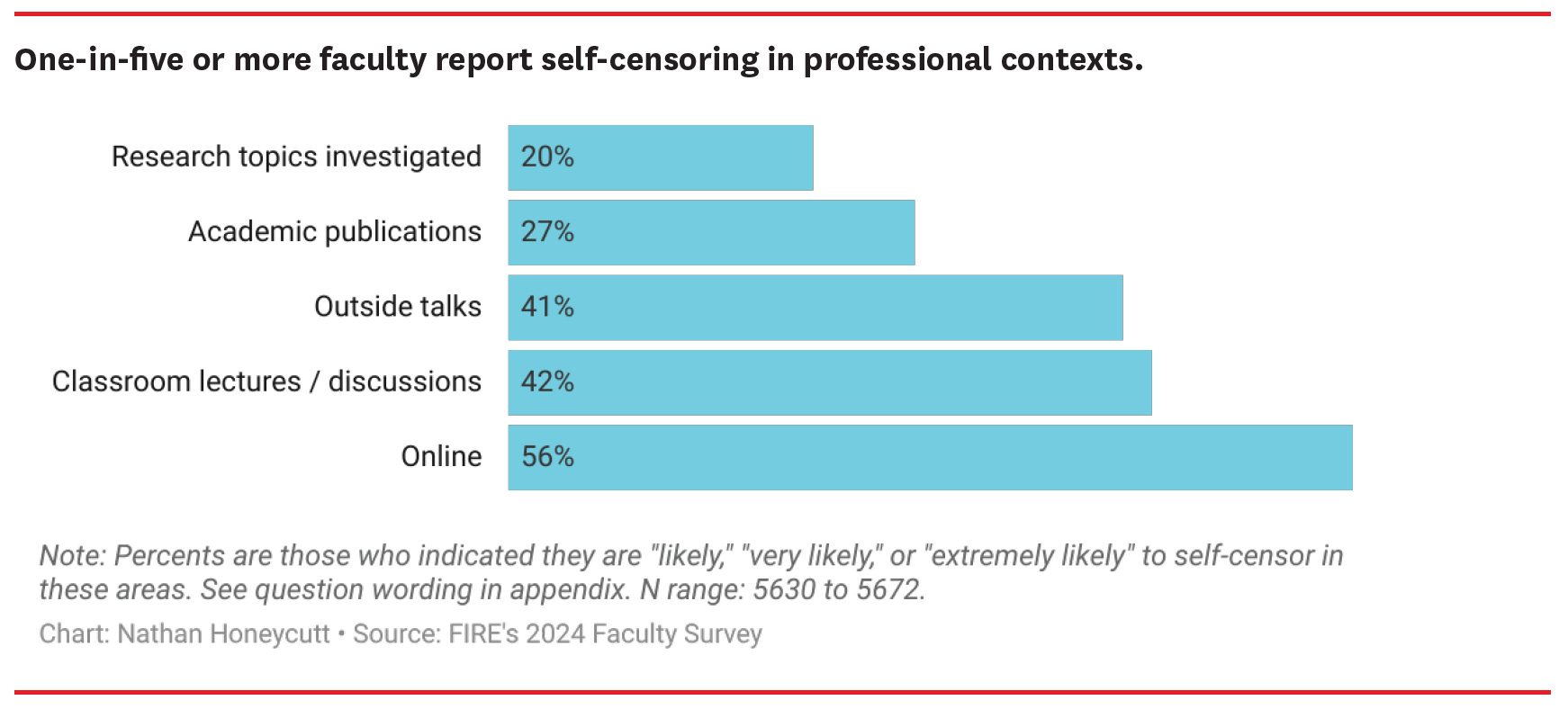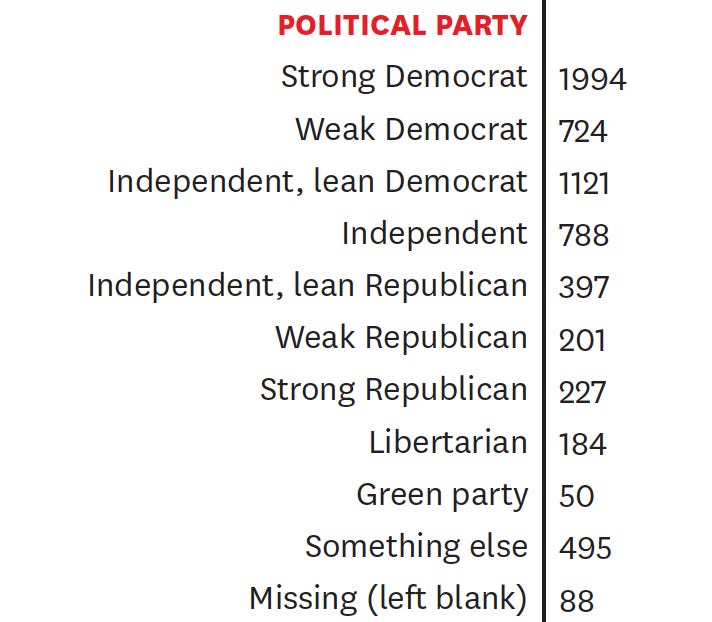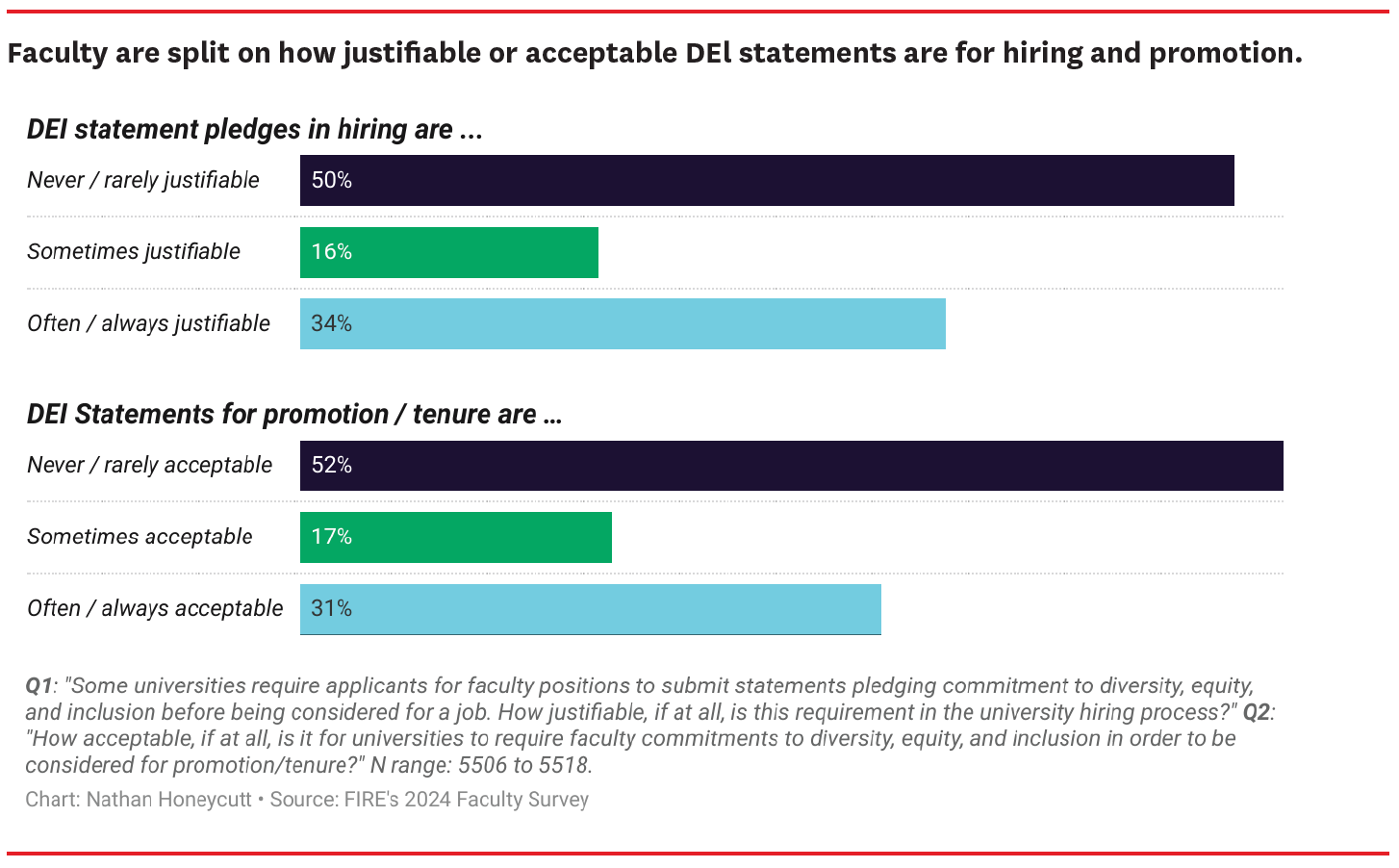Yves right here. Rajiv Sethi critiques and raises questions on a latest survey of political opinions and self-censorship amongst educating college at 55 universities. Not surprisingly, fairly a number of report believing they must preserve some views, notably on Israel and Palestine, to themselves.
Lots of you might be in academia or have shut connections there. Please describe your experiences in feedback.
By Rajiv Sethi, Professor of Economics, Barnard Faculty, Columbia College &; Exterior Professor, Santa Fe Institute. Initially revealed at his website
The Basis for Particular person Rights and Expression (FIRE) has launched the outcomes of a nationwide survey of college college that offers with freedom of expression on campus. There’s loads of attention-grabbing materials within the report, nevertheless it must be interpreted with some care.
The group contacted all energetic college in undergraduate-facing departments at 55 schools and universities. Most elite personal establishments and lots of flagship state universities had been included, and the listing of invited individuals numbered 112,510. A complete of 6269 individuals accomplished the survey, for a response charge of about 5.6 p.c.
This charge is throughout the typical vary for surveys of this sort, however instantly raises the query of representativeness. Those that took the time and hassle to submit responses had been a self-selected group who in all probability differ alongside a number of dimensions from those that selected to not take part. I think that the respondents had been disproportionately prone to have a usually favorable (or at the very least impartial) view of the group, and to have witnessed or skilled issues that they felt an urge to speak.
This must be saved in thoughts as one interprets the report.
For example, suppose that college within the ideological minority on a campus usually tend to self-censor in the midst of their skilled lives, and likewise extra inclined to submit responses to such surveys. This can have two results—the pool of respondents shall be extra ideologically balanced than the campus college as an entire, and the reported diploma of self-censorship shall be better than its precise incidence. And one can think about many different methods by which self-selection into the pool of respondents can lead studies to diverge from underlying realities.
This doesn’t imply that the survey is uninformative; quite the opposite, I feel its worth is immense. However the worth lies within the publicity of normal qualitative regularities slightly than particular quantitative claims.
With that preamble out of the way in which, let’s check out the findings.
The diploma of self-censorship within the skilled lives of responding college is substantial, affecting areas of analysis for one-fifth of them, classroom dialogue for two-fifths, and on-line exercise for a majority:

As well as, a few quarter of respondents have interaction in self-censorship in conversations with directors, colleagues, and college students, prompted by “concern of social, skilled, authorized, or violent penalties.” Based on the report, these “self-censorship dynamics… are extra prevalent and salient to conservative college, but additionally extra pronounced for college who’ve weaker job protections.”
There are numerous points about which college really feel unable or unwilling to talk overtly and actually, however on virtually each campus the one which tops the listing is the Israeli-Palestinian battle. This was talked about by 70 p.c of respondents total, and by greater than 80 p.c of these at Columbia, Harvard, Indiana College, Oklahoma State, Rutgers, Stanford, Syracuse, the College of Oregon, and Yale. The survey requested individuals the place their sympathies lay on this battle, and bought the next distribution of responses:
Supply: Silence within the Classroom: The 2024 FIRE School Survey Report
This implies to me that that college with a variety of views are holding their tongues.
Subsequent, take into account self-reported social gathering affiliation. About 61 p.c of respondents establish with or lean Democrat, 12 p.c establish with or lean Republican, 13 p.c are impartial, and the remainder are allied with smaller events, no events in any respect, or select to not disclose any affiliation:
 Supply: Silence within the Classroom: The 2024 FIRE School Survey Report
Supply: Silence within the Classroom: The 2024 FIRE School Survey Report
The distribution of self-reported political ideology is comparable: about 59 p.c are on the left, 17 p.c on the correct, 17 p.c are moderates, and the rest both don’t disclose any ideological dedication or don’t place themselves on this spectrum.
Lastly, take into account attitudes in the direction of range statements for hiring or promotion. These are thought-about by no means or not often justified by about half of respondents:

As within the case of self-censorship, there are vital variations in responses by college ideology—conservative college are overwhelmingly against such necessities, moderates are considerably much less strongly opposed, and liberals are fairly evenly divided.
What ought to one infer in regards to the college at giant based mostly on ends in the report? This query can’t be answered with out making some judgments in regards to the sorts of traits that have an effect on response charges. My very own view is that within the inhabitants invited to take part, conservative college are current in fewer numbers, self-censorship is much less frequent, and variety statements are much less strongly opposed than a literal studying of the report would recommend. However I don’t assume these distortions are giant, and the overall qualitative image rising from the survey within reason correct.1
I’ll make two different factors in closing.
A few years in the past, Lara Bazelon revealed an article by which she argued that the ACLU, “as soon as a bastion of free speech and high-minded beliefs… has change into in lots of respects a caricature of its former self.” It appears to me that FIRE now occupies the area that the ACLU has vacated.2 However it isn’t the one group taking a principled stand on behalf of free expression—an amicus transient by PEN America in help of College of Washington laptop scientist Stuart Reges is price studying.3
Free speech and educational freedom are at present subjects of animated debate on campuses throughout the nation, and issues are in a state of flux. Many establishments have taken steps in the direction of institutional neutrality and the adoption of the Chicago ideason freedom of expression. However the embrace of summary ideas comparable to these will do little to revive a local weather of free expression except the thorny downside of self-censorship is squarely addressed. The FIRE college survey—issues with self-selection however—provides us a way of the character and scale of the issue, and is subsequently an important start line.
There was a surge of recent subscribers to this text over the previous few days, which I feel is because of a point out on the DealBook vacation studying listing. I’m grateful to Sarah Kessler and the remainder of the staff for that suggestion, and hope that the brand new arrivals discover one thing of worth right here. And this shall be my final put up of 2024, so I want all readers a really Joyful New 12 months.
___________
1 One method to tackle the query of representativeness empirically is to look at the demographics of survey respondents alongside these of educational college as an entire. About 64 p.c of respondents to the survey had been male, and about 76 p.c had been white. These numbers may be in contrast with the school composition on the related establishments utilizing a searchable listing revealed by the Chronicle of Increased Schooling. The biggest variety of responses to the survey got here from the College of Michigan, which has a school that’s about 57 p.c male and 53 p.c white. Most different taking part establishments have related demographics, suggesting that respondents had been extra prone to be white and male than the inhabitants that was invited to take part. This doesn’t essentially suggest that race or gender affected response charges conditional on different traits comparable to age or seniority, however does imply that self-selection issues—respondents weren’t evenly drawn from completely different segments of the surveyed inhabitants.
2 I attended the group’s annual college community convention this yr, mentioned the expertise with Glenn Loury on his podcast, and took part (with Diana Mutz, Eugene Volokh, and John Hasnas) in a webinar on campus speech that was hosted by FIRE’s Director of School Outreach, Komi Frey.
3 Reges responded to a suggestion by college directors that he embrace a land acknowledgement on his syllabus by posting one which clearly mocked the very concept of such acknowledgements, and was disciplined for it. He sued, and a federal district courtroom sided with the college. The PEN America transient was submitted to the Ninth Circuit the place an attraction is pending.
